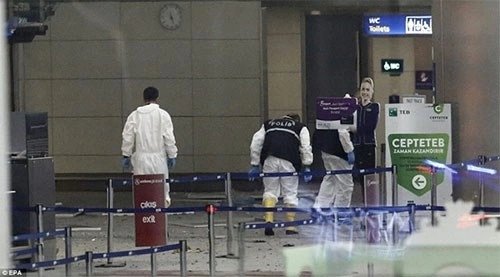At the same time as announcing the normalization of relations with Israel, Türkiye mended broken relations with Russia with an apology that was considered sincere for the attack on the Russian Su-24.
Since Turkey shot down a Russian Su-24 plane in the border area with Syria, Türkiye has become the focus of criticism because this event clearly revealed its tough and tough foreign policy. ambitions of President Tayyip Erdogan’s administration.
When the `Arab spring` movement broke out in 2010 with the climax of the crisis in Syria, Ankara styled itself as the person `controlling the storms in the Middle East` and having the power to influence the world.
Remember that after the Su-24 incident, then Turkish Prime Minister Ahmet Davutoglu made a defiant statement: `We will not let anyone dictate to us… Russia should understand that this is an area.`
Along with that were Ankara’s actions to intervene in the Syrian situation to overthrow President al-Assad’s government, but failed to achieve their goals.
A suicide bombing attacked Ataturk airport in Türkiye on June 29, 2016.
Not only Syria, Türkiye’s policy in the Middle East region was assessed as `sink to the bottom` before.
Not only causing friction with neighboring countries, President Tayyip Erdogan’s stance, considered authoritarian, has put Türkiye in a confrontational position with Europe regarding the refugee crisis.
In fact, in the past few years, Türkiye has had to taste the `bitter taste` of isolation after switching from a policy of `no disagreements with neighbors` to a situation of having no neighbors at all. There are problems with Turkey.
The increasing pressure of international isolation causes Türkiye to face many risks both domestically and internationally, in the context of increasing socio-political polarization and economic decline. escalating tensions both at home and abroad.
Economic and political instability due to broken relations with Russia, a country that plays a prominent role in the region and Türkiye’s top trading partner, is unquestionable.
Israel is America’s No. 1 important regional ally, a major ally with which Türkiye is hoping to improve relations.
The reality is that Ankara needs both Russia and Israel for its energy needs because Türkiye also cherishes a Russian gas pipeline project to Turkey to the south of Europe, bringing great benefits to the country.
And what cannot be ignored is Türkiye’s serious security challenge due to the threat of terrorist attacks from the self-proclaimed Islamic State (IS) as well as anti-government activities from Kurdish political movement.
Meanwhile, the event of the UK leaving the European Union (EU) warns of negative consequences for the bloc, making the EU less attractive than before to Ankara with negative impacts on the world economy.
In that chaotic situation, Ankara is forced to choose between seemingly unrealistic political ambitions in the region and immediate economic and security benefits.
Reconciling with both Russia and Israel, Türkiye can strengthen cooperation in the field of security and counter-terrorism at home and in the region, which is a top concern.
Regardless, Türkiye is still a country with an important geopolitical position in the region, considered a model for other Muslim countries because it is relatively democratic and has a fairly efficient economy.
This is a smart step by President Tayyip Erdogan’s administration, which is facing public criticism because of its tough stance in domestic and foreign affairs.
In fact, a few years ago before the emergence of the `Arab Spring` movement, Turkey’s foreign policy was considered smart and effective when Ankara advocated building neighboring relationships.
Therefore, after political miscalculations and inappropriate steps, Ankara is taking necessary corrective steps, both contributing to ensuring vital interests and helping the country gradually regain strength in the world.
According to My Hanh
National Army


